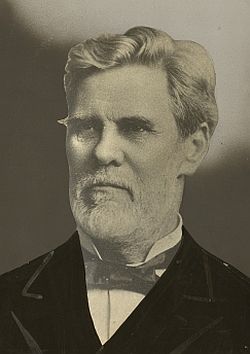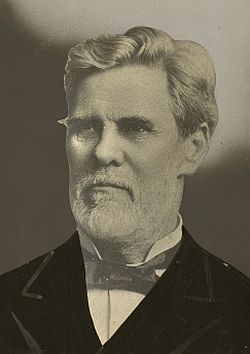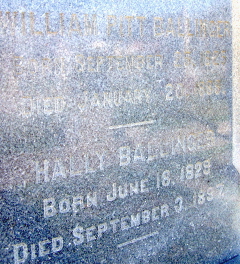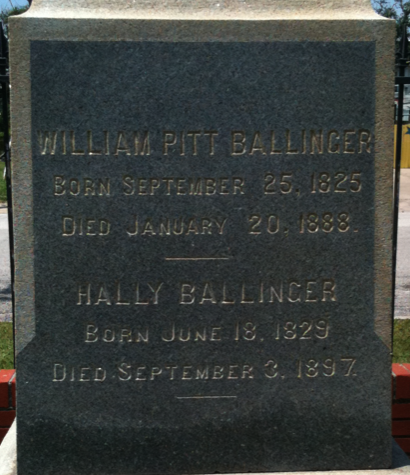From the "Handbook of Texas"
BALLINGER, WILLIAM PITT (1825-1888). William Pitt Ballinger, attorney, was born at Barbourville, Kentucky, on September 25, 1825, the son of James Franklin and Olivia (Adams) Ballinger. He attended St. Mary's College in Bardstown, Kentucky, moved to Galveston in 1843, and began the study of law with an uncle, James Love. He was admitted to the bar in 1847. During the Mexican War he enlisted as a private and advanced through the ranks to be adjutant of Albert Sidney Johnston's regiment.
In 1850 Ballinger married Hallie P. Jack of Brazoria County; the couple had three daughters and two sons. Ballinger served as a United States district attorney for Texas from 1850 until 1854, when he became a partner in a Galveston law firm with Thomas McKinney Jack and M. L. Mott. He successfully represented a group of Galveston wharf owners, who wished to retain possession of their property, against the City of Galveston. The case went to the Texas Supreme Court in 1859. In 1861 Ballinger was appointed Confederate receiver by Judge D. G. Hill of the Confederate District Court.
Gov. Pendleton Murrah and Gen. John Bankhead Magruder, commander of the district of Texas, appointed Ballinger and Ashbel Smith special commissioners at the end of the Civil War to secure terms of peace for the state. The commissioners arrived in New Orleans May 29, 1865, and petitioned for a conference with Gen. Edward R. S. Canby, but he was without authority to treat the subjects broached by the Texans. Ballinger declined appointments to the Texas Supreme Court in 1871 and 1874. He participated in the Constitutional Convention of 1875 as a member of the Judicial Committee. Texans offered Ballinger the Democratic nomination for governor in July 1878, but he refused.
His daughter Betty, with Hally Bryan Perry, organized the Daughters of the Republic of Texas. Ballinger died in Galveston on January 20, 1888. The county seat of Runnels County was named in his honor."
---------------------------------------------------------------------
"The growing sectional conflict deeply disturbed Ballinger. A staunch nationalist, Ballinger, himself a small slaveholder, was opposed to secession. Like many Texas unionists, however, Ballinger threw his support to the Confederacy once the majority of Texans voted for separation. He was appointed receiver of alien enemy property and labored tirelessly for a Southern victory in the war."
-- from review in Mississippi Quarterly of William Pitt Ballinger: Texas Lawyer, 1825 - 1888, by John Anthony Moretta. Austin: Texas State Historical Association, 2000
From the "Handbook of Texas"
BALLINGER, WILLIAM PITT (1825-1888). William Pitt Ballinger, attorney, was born at Barbourville, Kentucky, on September 25, 1825, the son of James Franklin and Olivia (Adams) Ballinger. He attended St. Mary's College in Bardstown, Kentucky, moved to Galveston in 1843, and began the study of law with an uncle, James Love. He was admitted to the bar in 1847. During the Mexican War he enlisted as a private and advanced through the ranks to be adjutant of Albert Sidney Johnston's regiment.
In 1850 Ballinger married Hallie P. Jack of Brazoria County; the couple had three daughters and two sons. Ballinger served as a United States district attorney for Texas from 1850 until 1854, when he became a partner in a Galveston law firm with Thomas McKinney Jack and M. L. Mott. He successfully represented a group of Galveston wharf owners, who wished to retain possession of their property, against the City of Galveston. The case went to the Texas Supreme Court in 1859. In 1861 Ballinger was appointed Confederate receiver by Judge D. G. Hill of the Confederate District Court.
Gov. Pendleton Murrah and Gen. John Bankhead Magruder, commander of the district of Texas, appointed Ballinger and Ashbel Smith special commissioners at the end of the Civil War to secure terms of peace for the state. The commissioners arrived in New Orleans May 29, 1865, and petitioned for a conference with Gen. Edward R. S. Canby, but he was without authority to treat the subjects broached by the Texans. Ballinger declined appointments to the Texas Supreme Court in 1871 and 1874. He participated in the Constitutional Convention of 1875 as a member of the Judicial Committee. Texans offered Ballinger the Democratic nomination for governor in July 1878, but he refused.
His daughter Betty, with Hally Bryan Perry, organized the Daughters of the Republic of Texas. Ballinger died in Galveston on January 20, 1888. The county seat of Runnels County was named in his honor."
---------------------------------------------------------------------
"The growing sectional conflict deeply disturbed Ballinger. A staunch nationalist, Ballinger, himself a small slaveholder, was opposed to secession. Like many Texas unionists, however, Ballinger threw his support to the Confederacy once the majority of Texans voted for separation. He was appointed receiver of alien enemy property and labored tirelessly for a Southern victory in the war."
-- from review in Mississippi Quarterly of William Pitt Ballinger: Texas Lawyer, 1825 - 1888, by John Anthony Moretta. Austin: Texas State Historical Association, 2000
Family Members
Advertisement
Records on Ancestry
Advertisement




















